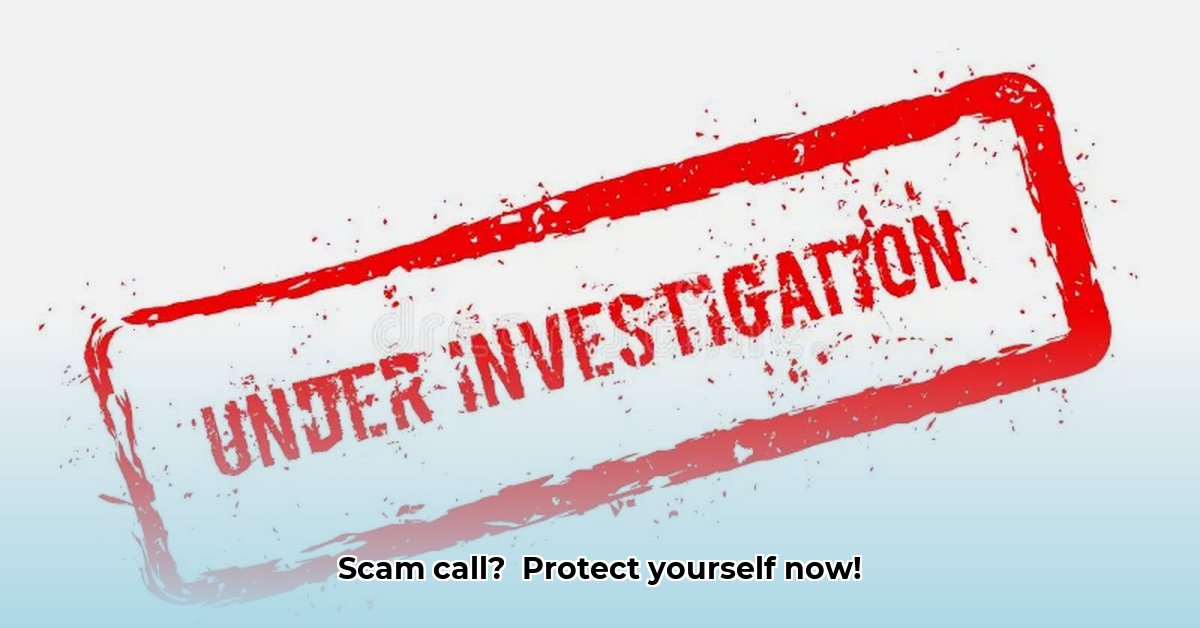
Receiving a call claiming you're under investigation is terrifying. Fortunately, many such calls are scams using phone number spoofing (a technique to disguise the caller's identity). This guide provides actionable steps to identify and avoid these fraudulent calls, protecting your personal information and peace of mind. For more information on similar scams, see this helpful resource: Blue Sky Lending Scam.
Understanding the Spoofing Scam: The Digital Disguise
Scammers employ phone number spoofing to make their calls appear as if they're from legitimate authorities (police, IRS, banks). This illusion of authority creates urgency and fear, increasing the likelihood of you revealing sensitive information. While precise statistics are difficult to obtain due to underreporting, these scams are prevalent, targeting individuals across various demographics. They rely on the inherent trust most people have in official institutions.
Identifying a Scam Call: Spotting the Red Flags
Before reacting, assess the call for these warning signs:
- Unexpected Contact: Did the call come out of the blue from an unknown number? Legitimate organizations typically use established communication channels.
- Aggressive Demands: Are they aggressively requesting personal details (Social Security number, bank account information, passwords)? This is a major red flag. Legitimate investigators don't use high-pressure tactics.
- Unusual Language: Does the communication contain grammatical errors, unusual phrasing, or an unprofessional tone? Government agencies and reputable businesses maintain professional communication standards.
- High-Pressure Tactics: Are they pressuring you to act immediately, creating a sense of urgency or impending doom? Genuine inquiries allow time for verification.
- Suspicious Requests: Do they ask for unusual things like gift cards or wire transfers for supposed fines or taxes?
These indicators suggest a potential scam. Remember that a familiar name or number doesn't guarantee legitimacy—spoofing makes it easy for scammers to mimic trusted entities.
How to Respond to a Suspicious Call: Your Action Plan
- Do Not Engage: Avoid confirming your identity or answering any questions. Silence is your best defense.
- Hang Up Immediately: End the call promptly. Don't wait for further instructions.
- Ignore Follow-ups: Scammers frequently contact victims through texts or emails. Ignore all subsequent communications.
- Report the Incident: File a report with the Federal Trade Commission (FTC) at https://reportfraud.ftc.gov/ and your local law enforcement. This helps authorities track and prosecute these criminals efficiently. Providing details about the call is crucial to aid investigations.
Protecting Yourself: Proactive Security Measures
Proactive steps can significantly reduce your vulnerability to these scams:
- Enable Caller ID Verification: Many phone providers offer services to authenticate calls and block suspicious numbers. Activating these features helps filter out unwanted calls.
- Use Call-Screening Apps: Several apps identify and block potentially fraudulent calls by analyzing incoming numbers and call patterns, offering an additional layer of protection.
- Question Urgent Requests: Be wary of unsolicited communications demanding immediate action, especially concerning finances or personal information. Always verify requests independently through known official channels.
- Stay Informed: Regularly update yourself on common scams and fraud techniques by consulting reputable cybersecurity resources such as the Cybersecurity and Infrastructure Security Agency (CISA). Staying informed empowers you to recognize and avoid these scams.
Resources: Reporting and Further Assistance
- Federal Trade Commission (FTC): https://reportfraud.ftc.gov/ – Report scams and access consumer protection resources.
- Cybersecurity and Infrastructure Security Agency (CISA): https://www.cisa.gov/ – Access cybersecurity resources and stay updated on current threats.
- Your Local Police Department: Report suspicious activities to your local law enforcement agency.
Remember, legitimate organizations will never demand sensitive information without prior verification through established channels. Being cautious, informed, and proactive is your best defense against phone number spoofing scams.